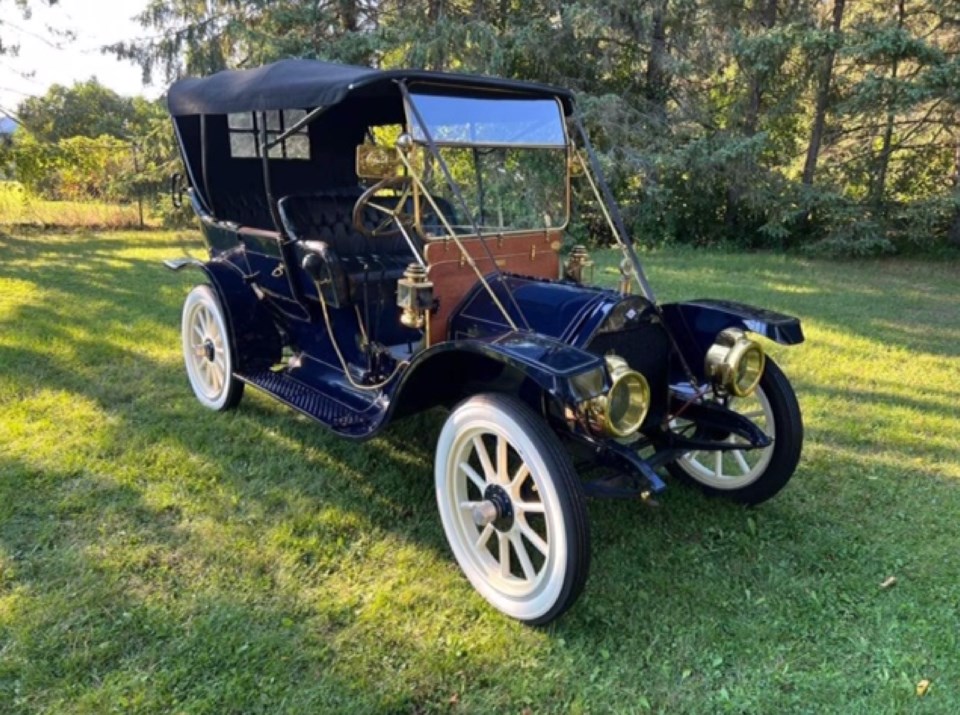An important piece of Orillia’s history could soon be driving into the impressive collection of the Simcoe County Museum.
This week, during a committee of the whole meeting of Simcoe County council, regional politicians gave the green light to spend $45,000 to purchase a rare 1911 Tudhope-Everitt car that was manufactured in Orillia. The decision is subject to ratification at the next county council meeting.
According to a report prepared by Kelley Swift Jones, the curator of the museum, there are only four known Tudhope-Everitts still in existence: two 1911 models, and two from 1912.
One 1911 model is part of the Burnaby Village Museum collection in British Columbia; the second is the one the county museum hopes to add to its collection.
The car is an “absolutely terrific acquisition,” said Don Allen, mayor of Springwater Township.
Allan Greenwood, the county’s director of public affairs, agreed, saying the vintage vehicle “fits in brilliantly” with the museum’s collection and its long-term plan.
“The museum has a number of transportation pieces that will fit very well ... This vehicle will fit beautifully as well,” he told county councillors.
“The history of the car and the history of the factory that was in Orillia is quite fascinating,” he said, noting research shows the factory was “very meaningful not just to Canada, but specifically to our region.”
That history was spelled out in the report that noted James Brockett (J.B.) Tudhope was born in Oro Township in 1858.
In the 1880s, he began working at his father’s carriage business in Orillia. By 1902, the Tudhope Carriage Co. Ltd. spanned three city blocks in the downtown area.
The Tudhope Anderson Company Ltd. (TACO) was formed in 1906, and produced farm wagons and equipment.
By September 1908, J.B. Tudhope extended the carriage business into automobiles. The first model in 1909 was based on a collaboration with the Indiana-based W.H. McIntyre Company. Sometimes referred to as a “horseless carriage,” the design was thought to be simple and practical.
Approximately 500 of these vehicles were produced before a fire destroyed the factory in 1909.
The Tudhope-Everitt model was introduced in 1910, and used a four-cylinder, 30-horsepower engine. Unlike most other Canadian car companies, the cars were built almost entirely in the Tudhope plant.
Unfortunately, the report explained, due to larger company mergers and strong competition, the company faltered in 1913 and was taken over, with the new owners forming the Fisher Motor Co. The company sold cars made in Orillia under the Fisher name.
The addition of the 1911 Tudhope-Everitt to the museum collection is “significant, as it tells the story of early 20th-century industry in Simcoe County, and the transition in Simcoe County and Ontario from horse and wagon to automobiles,” notes the report.
“The rarity of this automobile provides added value to the museum collection, and further supports the interpretive themes of innovation and transportation.”
Greenwood said an evaluation was made of the vehicle and noted the $45,000 price tag also includes bringing the car to the museum from its current home in Smiths Falls.
The funds will come from the museum’s reserve, which currently has a balance of $50,000. Each year, $5,000 is transferred to the museum reserve account through the budget process for the purchase of objects for the collection.
